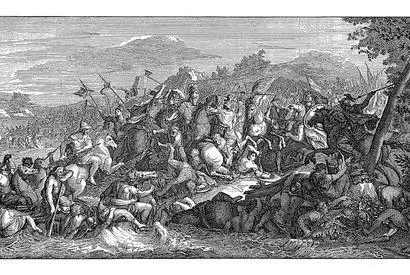Abstract: The Middle East and its close regional connecting states, such as Iran, are beginning to experience the first impacts of the Ukraine War and its accompanying economic fallout. The effects are being experienced in different ways according to the distinct trade and economic arrangements that countries have made that link them with the conflict’s parties.
Bottom-line-up-front: Said negative effects may spread beyond the key partners as they have to pass along additional shortfalls to their neighbors in different forms. While these are not immediately apparent, some economic consequence is usually passed downstream to trading partners or to aid programs. Yemen will not receive wheat aid which is received from partner nations funneled through United Nations auspices. There is a need to maintain both economic and food stability to prevent national uprisings and collapses in governments, creating additional crises beyond the region.
Problem statement: How does the economic fallout of the Ukraine War influence the Middle East?
So what?: With long term shocks to the world economies and the disruptions in the supply chain during the COVID-19 pandemic and now the Ukraine War, the rush is on in the Middle East to no longer have over-extended, multi-country dependent supply chains that are vulnerable to systemic shock and disruption that can weaken the government’s ability to provide its people. These conflicts and natural events are waking nations up to the dangers of an international system that cannot be guaranteed to always work.

Source: shutterstock.com/C.Aphirak
Wheat and Gas
Many Middle East countries receive their wheat and gas through bulk imports from Ukraine and Russia. Ukraine has been called “Europe’s breadbasket”, but it also supplies a large number of Eastern Mediterranean countries. Each of the Middle Eastern countries that receive supplies from Ukraine has differing agreement structures allowing more or less wheat, which leads to different levels of crisis and response. Lebanon has not prepared their economy for a shortfall by working to obtain more than is absolutely necessary. Egypt has attempted to order slightly more than is necessary in order to gather a ready reserve. The experiencing of direct impacts from the war will not take place at the same time nor to the same level. As indicated, some countries have greater buffer periods due to the structure of their agreements and the number of resources on hand. Lebanon will, and is, already experiencing the most direct impact, while Egypt will likely see the most noticeable impact in the coming months. However, Middle East Eye reports that prices have begun to climb slightly in Cairo.
Ukraine has been called “Europe’s breadbasket”, but it also supplies a large number of Eastern Mediterranean countries.
Lebanon, Egypt, and Iran are the countries that are beginning to experience direct impacts on their economies. Of the three, Iran is thus far the most impacted as it has direct relations with Moscow and has closer ties to the Russian economy. Other countries, such as Kuwait and Iraq, are beginning to take additional measures to diversify their wheat and gas dependency on these high conflict zones.[1]
The Immediate Impact
The Iranians have been impacted by the cessation of flights by all major and many minor Russian airline companies.[2] The total ceasing of air operations means that some people may be stranded in either Iran or Russia with little or no means of reuniting with loved ones, returning from business trips, or other travel needs. More impactingly, the lack of flights means that important shipments of durable and non-durable goods, as well as food goods to and from Iran to vital Russian markets, will break down. Due to a prolonged drought and mismanagement of water resources, Iran already suffers from food and good scarcity, with its economy being at its lowest point in many decades. The Iranians are in such a dire economic condition that, even if the embargoes and sanctions were lifted in the next few days, it would take months to years to reverse the economic damage that has occurred. Iran is currently facing open opposition, with the government facing measurable protests and uprisings in parts of Iran, including the main city of Tehran. Public servants, whose salaries have not been paid in six months, have openly protested and advocated for change. The additional weight on the economy from a suspension of flights may only exacerbate these tensions. Moreover, the state of the climate and man-made disasters in water management means that the economic aspects of Iran’s downturn are not entirely due to American or Western sanctions and will continue long after. The Iranian economy cannot suffer too many setbacks given the priority now is the need for food and goods to help keep store shelves full so average Iranians can buy the commodities they need. Iran also relies on Russia to host and sell its goods. It is one of the largest suppliers of saffron, a spice used in food and medicinally. As such, this raw material has become one Iran’s largest natural resource exports. However, the market is endangered by two forces. Israeli competition through shorter growth periods and massive indoor, specialized growing farms as well as the Ukraine war shutting access to markets and secondary off-market sales. Indeed, the longer the Ukraine conflict lasts and the more damage to the Russian economy, the more impact it will have on Iran.
Due to a prolonged drought and mismanagement of water resources, Iran already suffers from food and good scarcity, with its economy being at its lowest point in many decades. The Iranians are in such a dire economic condition that, even if the embargoes and sanctions were lifted in the next few days, it would take months to years to reverse the economic damage that has occurred.
Lebanon has just received one of the last two shipments of Ukrainian wheat that it anticipates receiving.[3] According to L’Orient Today, a reliable Lebanese source, two ships bringing wheat to the market departed before the war broke out, and no more ships could depart Ukrainian ports. Russia is the second-largest supplier of wheat to Lebanon but the shipment of wheat is anticipated to be either wholly interrupted or significantly delayed. This will trickle down into the economy, and bread makers have already had rationing of supplies imposed on them as well as restrictions as to types of bread that can be made, catering particularly to Islamic kosher bread and setting aside the needs of other communities in the larger population centers. Fuel prices are also anticipated to spike. Gas stations that closed on their own initiative were forced to re-open due to government pressure to prevent hoarding until prices reached their maximum or fresh peaks. The gas station owners have periodically closed their stations during price fluctuations, waiting for the prices to stabilize at high values. The government has been trying to balance between not setting prices and providing subsidies yet also attempting to ensure that average Lebanese citizens do not experience even longer gas lines as well as some of the violence that broke out at gas stations in late 2020 and early 2021.
Russia is the second-largest supplier of wheat to Lebanon but the shipment of wheat is anticipated to be either wholly interrupted or significantly delayed.
Egypt has been preparing for any event that would cut off its wheat imports from Ukraine.[4] According to news reports, Egypt receives 80% of its wheat imports from Ukraine and has been steadily developing a ready reserve of wheat from which it can draw on in times of crisis. Government officials state that this reserve is sufficient to cover four months of total cutoffs enabling it to find alternative sources and get those in place without much noticeable disruption. The government of Egypt has been planning to increase its wheat production capacity is setting aside an additional 1 million acres next year. It has already allocated an additional 250,000 acres this year and will be planting this new crop in the forthcoming months. The foresight of this plan and its diversification strategy is one that is well in advance of other countries in the region, notably Lebanon. According to multiple news sources, Reuters among them, Lebanon lost a significant amount of storage capacity in August of 2020 and has not been able to import large amounts of wheat nor store additional capacity due to the downturn of its economy and the stalled political crisis from which it is only now emerging.[5]
Egypt receives 80% of its wheat imports from Ukraine and has been steadily developing a ready reserve of wheat from which it can draw on in times of crisis.
Kuwait has decided to move forward with a long-term plan to stockpile food in an unspecified number of warehouses that it plans to build around the country.[6] The food is to be tapped in times of national emergency and, one suspects, in the case of a nuclear conflict in which food supplies and general supplies of all types are suspended for an indefinite amount of time. The government has also issued an order to store large quantities of iodine supplements. These are taken in the case of nuclear fallout or radiation, particularly that which may become aerosolized and spread by regional winds. This measure was adopted as a part of additional measures that were not disclosed after a closed-door summit with the Parliament and members of the leadership.
Self-Sustainable and Resilient
Self-sufficiency and the ability to withstand long periods of disruptions are the most significant trends exhibited by Egypt and Kuwait. Further looks at other Middle East nations may result in the same pattern. These measures also ensure that there will be national stability and that there will be limits to the potential of additional, smaller regional conflicts as a result of the Ukraine War. However, Lebanon’s and Iran’s situation may make such measures more difficult and thus make stability in those places much harder to obtain.
James Bowden, M.A. is a research historian whose main research interests are military philosophies as represented in military systems purchases and identifying underlying cultural values through these and defense doctrines. Mr. Bowden has been published in research journals covering both the military history of the ancient Near as well as the contemporary Middle East. The views presented in this article are the authors alone.
[1] “The food crisis in Iraq, “Cheap dollar” to dismantle “a ticking bomb”,” last accessed March 11, 2022, https://shafaq.com/en/Report/The-food-crisis-in-Iraq-Cheap-dollar-to-dismantle-a-ticking-bomb.
[2] “Russia cancels flights on Moscow-Tehran-Moscow route,” last accessed March 11, 2022, https://shafaq.com/en/World/Russia-cancels-flights-on-Moscow-Tehran-Moscow-route.
[3] “New gasoline crisis fears, budget draft changes, Fattal CEO murdered: All you need to know this Monday,” L’Orient Today, March 07, 2022, last accessed March 11, 2022, https://today.lorientlejour.com/article/1292845/new-gasoline-crisis-fears-budget-draft-changes-fattal-ceo-murdered-everything-you-need-to-know-to-start-your-monday.html.
[4] Mohammad Hanafi, “Egypt may plant 2 million acres of wheat to compensate for Ukraine war,” Al Monitor, March 03, 2022, last accessed March 11, 2022, https://www.al-monitor.com/originals/2022/03/egypt-may-plant-2-million-acres-wheat-compensate-ukraine-war.
[5] Ellen Francis, Maha El Dahan, “After blast, Lebanon has less than a month’s grain reserves,“ Reuters, last accessed March 11, 2022m https://www.reuters.com/article/us-lebanon-security-blast-wheat/after-blast-lebanon-has-less-than-a-months-grain-reserves-idUSKCN251190.
[6] B Izzak, “Amir tells MPs Kuwait not immune to crisis fallouts,” Kuwait Times, last accessed March 11, 2022, https://www.kuwaittimes.com/amir-tells-mps-kuwait-not-immune-to-crisis-fallouts/.






